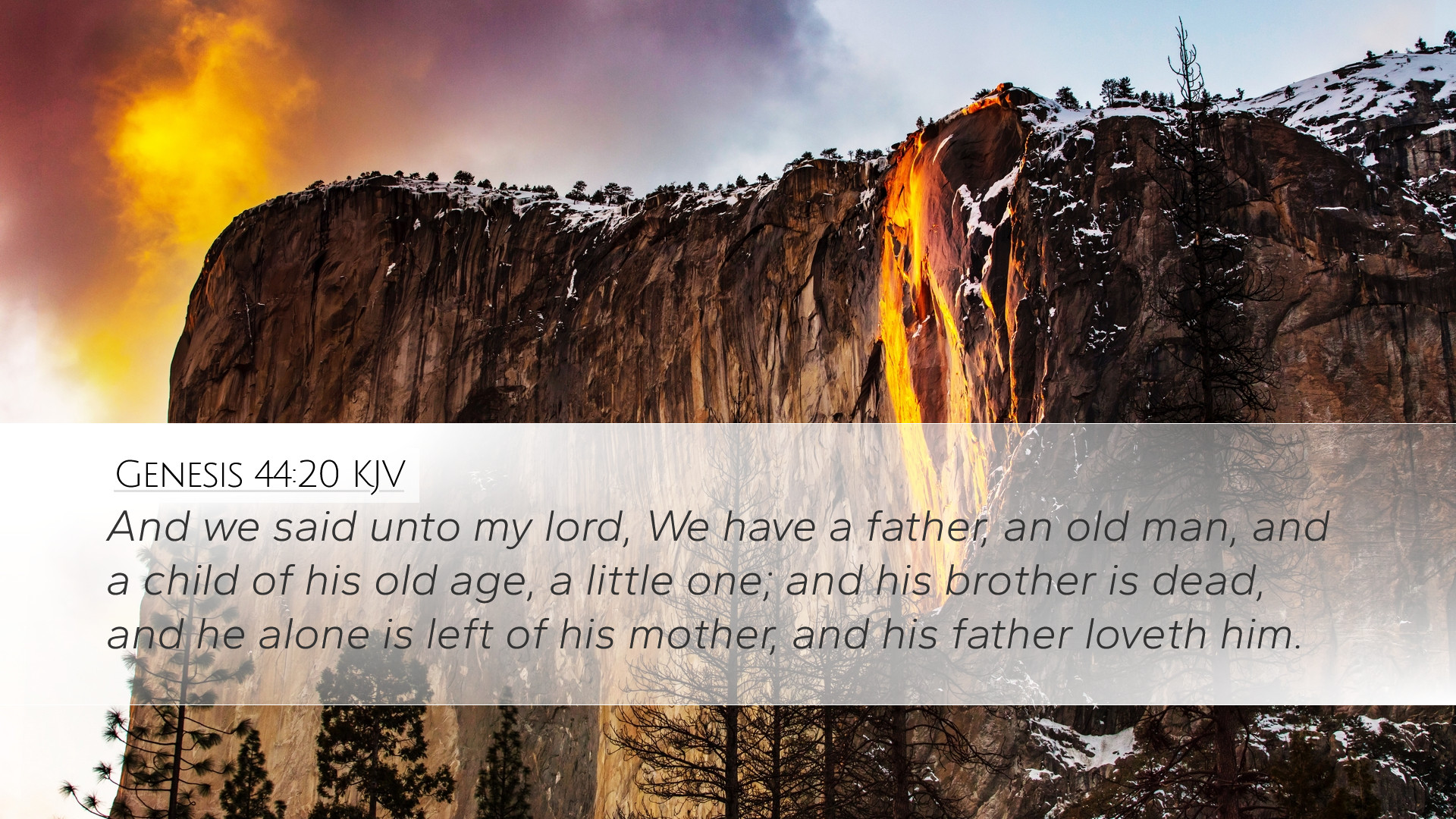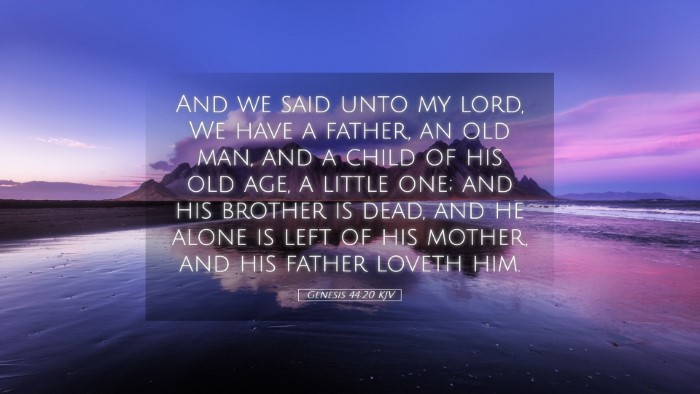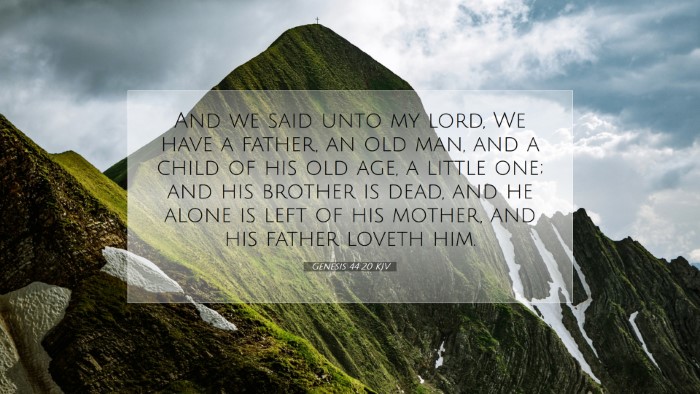Commentary on Genesis 44:20
Genesis 44:20 presents a pivotal moment in the narrative of Joseph and his brothers. The verse recounts how the brothers, upon being confronted with the accusation of theft, provide a poignant testimony regarding their family circumstances. This commentary synthesizes insights from prominent public domain commentators such as Matthew Henry, Albert Barnes, and Adam Clarke, to deepen the understanding of this text.
Contextual Background
To fully grasp the significance of Genesis 44:20, it is essential to consider the broader context of the narrative. This verse is part of a larger story in which Joseph tests his brothers upon their return to Egypt. Joseph, having risen to power, desires to ascertain the character and remorse of his brothers, who previously sold him into slavery. Their experiences and familial dynamics play a critical role in this moment.
Text of Genesis 44:20
"And we said unto my lord, We have a father, an old man, and a child of his old age, a little one; and his brother is dead, and he alone is left of his mother, and his father loveth him."
Insights from Matthew Henry
According to Matthew Henry, this verse encapsulates the deep family ties and the weight of sorrow that permeate the brothers’ lives. He emphasizes that the mention of the "old man" denotes Jacob's significant frailty and the burden of grief he carries for Joseph, whom he believes is dead. The reference to the "child of his old age," likely Benjamin, highlights the affection Jacob has for his remaining son, further revealing the brothers' understanding of their father's emotional state.
Henry also notes that the brothers’ explanation serves multiple purposes: it is a defense concerning their integrity, but it also reveals their underlying guilt and concern for their father's wellbeing. Their words reflect a moment of vulnerability and reflect their transformation, suggesting they bear the weight of past transgressions against Joseph.
Insights from Albert Barnes
Albert Barnes elaborates on the psychological complexities within this verse. He underscores the tension between the brothers' fear of losing another brother and their guilt over the loss of Joseph. Barnes posits that their deep-seated loyalty to their father plays a crucial role in their emotional responses and decisions. The brothers’ acknowledgment of their father’s grief signals an awareness of past mistakes and a desire to avert further pain.
Moreover, Barnes views this confession as a moment of critical honesty. It provides a narrative pivot, allowing the reader to see growth in the brothers' characters as they own their history. This moment of telling the truth about their family dynamics demonstrates their shifting identities from those who betrayed to being protectors of their family's integrity.
Insights from Adam Clarke
Adam Clarke offers profound insights into the emotional landscape of the characters involved. He remarks on the significance of familial bonds depicted in this verse. Clarke highlights the linguistic nuances, interpreting the term "little one" as an indication of Benjamin's vulnerability and significance within this family narrative. Such expressions convey the protective instinct the brothers feel towards Benjamin, intensifying the scene's emotional gravity.
Clarke suggests that their declaration illustrates the weight of familial obligations that bind them together. It signifies an appeal to Joseph's compassion, displaying their awareness of their precarious situation and their hope for mercy. The depth of their relationship with their father serves as a reminder of their humanity and the need for redemption.
Theological Reflections
Genesis 44:20 not only reflects human frailty but also resonates with deeper theological themes. It invites pastors, students, and theologians to consider the nature of guilt, redemption, and family dynamics in light of God's providence.
- The Theme of Guilt and Forgiveness: The brothers' acknowledgment of their past sins becomes a critical step toward redemption. This aspect of their journey underscores the Christian understanding of confession and the potential for reconciliation.
- God’s Sovereignty and Providence: The narrative skillfully illustrates how God orchestrates circumstances for His purposes. Joseph’s rise to power becomes a vehicle for the survival of his family, emphasizing the idea that what was meant for evil can be turned to good.
- Family Dynamics and the Weight of Tradition: This verse showcases the complexities of familial love and responsibility. The responsibilities of brotherhood and sonship weigh heavily upon them, mirroring the struggles faced in contemporary family settings.
Conclusion
Genesis 44:20 serves as a significant reflection on the nature of familial bonds, guilt, and the path to redemption. Insights from Matthew Henry, Albert Barnes, and Adam Clarke enrich our understanding of this critical moment in the Joseph narrative. For pastors, students, theologians, and Bible scholars, this verse encapsulates essential truths about human relationships and divine providence, encouraging deeper reflection on the complexities of our actions and the possibility of reconciliation and healing.


